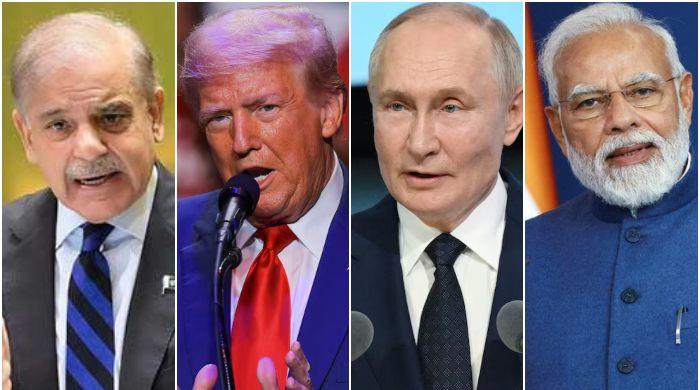US-Brokered Ceasefire Between Pakistan and India Discussed by Trump and Putin
The recent armed conflict between Pakistan and India, which previously dominated global headlines, continues to resonate geopolitically. The issue was recently addressed during a phone conversation between US President Donald Trump and Russian President Vladimir Putin.
According to a statement released by the Kremlin on Wednesday, Russian President’s aide Yuri Ushakov stated that the Middle East and the armed conflict between India and Pakistan, which was stopped with President Trump’s personal involvement, were both discussed.
Earlier that day, the two presidents had an approximately one hour and fifteen-minute phone call during which they addressed a number of topics, including the situation in Ukraine. President Putin emphasized that Moscow would respond to recent attacks on its airbases.
The discussion of the recent limited conflict between Islamabad and New Delhi took place against the backdrop of cross-border clashes between the two nuclear-armed neighbors, which raised concerns around the world and prompted Washington to intervene. President Trump declared a ceasefire, which was widely welcomed.
The military confrontation between Pakistan and India, which included cross-border strikes by both sides, occurred weeks after 26 tourists lost their lives. Following the incident, India initiated unprovoked attacks on Pakistan, targeting innocent civilians for three consecutive days. The Pakistan Armed Forces responded defensively with Operation Bunyan-um-Marsoos.
Pakistan shot down several IAF fighter jets and numerous drones. After at least 87 hours, the conflict concluded on May 10 with a ceasefire agreement facilitated by the United States.
Since the US-brokered ceasefire, Islamabad and New Delhi have engaged in global diplomatic efforts to articulate their positions on the recent clashes.
For Pakistan, Bilawal Bhutto-Zardari, former foreign minister and Chairman of the Pakistan Peoples Party (PPP), is leading a parliamentary delegation to present Pakistan’s perspective on the recent military confrontation with India and challenge New Delhi’s narrative on the world stage.
The parliamentary delegation consists of Hina Rabbani Khar, Sherry Rehman, Dr. Musadik Malik, Khurram Dastgir Khan, Jalil Abbas Jilani, Tehmina Janjua, Bushra Anjum Butt, and Syed Faisal Subzwari.
Speaking to the Pakistani community in New York, Bilawal cautioned about the potential for escalation in South Asia, highlighting that any miscalculation could lead to a nuclear conflict with worldwide implications.
The politician emphasized that a nuclear conflict would have ramifications for the entire globe, making it crucial for Pakistan to present its case, urge the international community to continue its role as it did during the ceasefire, and encourage India to abandon its strategy and engage in comprehensive dialogue with Pakistan.
The issue of Kashmir was also brought up by the young politician as a “key component of any comprehensive dialogue” with India, stressing that the Kashmir dispute should not be disregarded.
In an interview with China’s CCTV News, the former FM emphasized the necessity of a permanent, joint investigative forum between India and Pakistan to investigate not just the terror attacks, but all terror incidents affecting both nations.
He stated that a neutral platform could assist both sides in seeking justice and preventing future bloodshed.
Bilawal reaffirmed Pakistan’s commitment to peace, stating that any military response had been in self-defense.
His remarks on discussions between the two nations reflect his earlier statement, in which he urged the international community to press India toward a comprehensive dialogue with Pakistan, warning that the recent military escalation between the two nuclear-armed neighbors had dangerously lowered the threshold for conflict.
Shashi Tharoor, an Indian Congress MP, has also suggested the possibility of dialogue between Pakistan and India. He recently led an all-party parliamentary delegation to Brazil and stated that New Delhi would be open to talks with its neighbor only if Islamabad takes verifiable action against the “infrastructure of terrorism that is visible everywhere” within its borders.



Comments (0)
No comments yet. Be the first to comment!
Leave a Comment